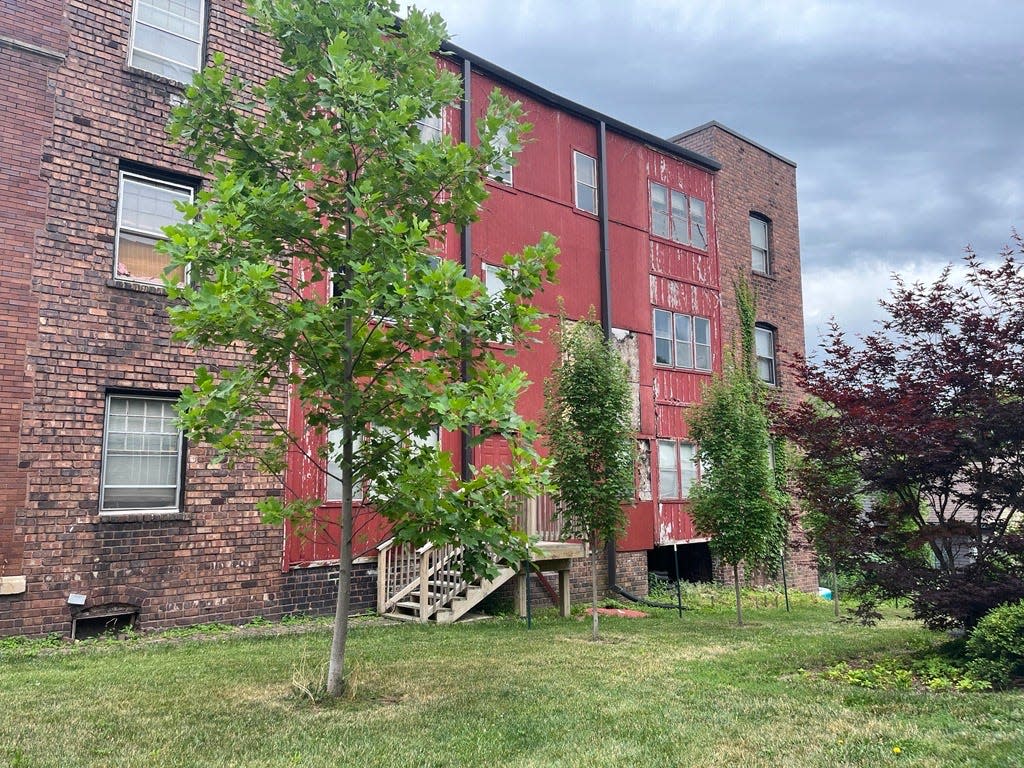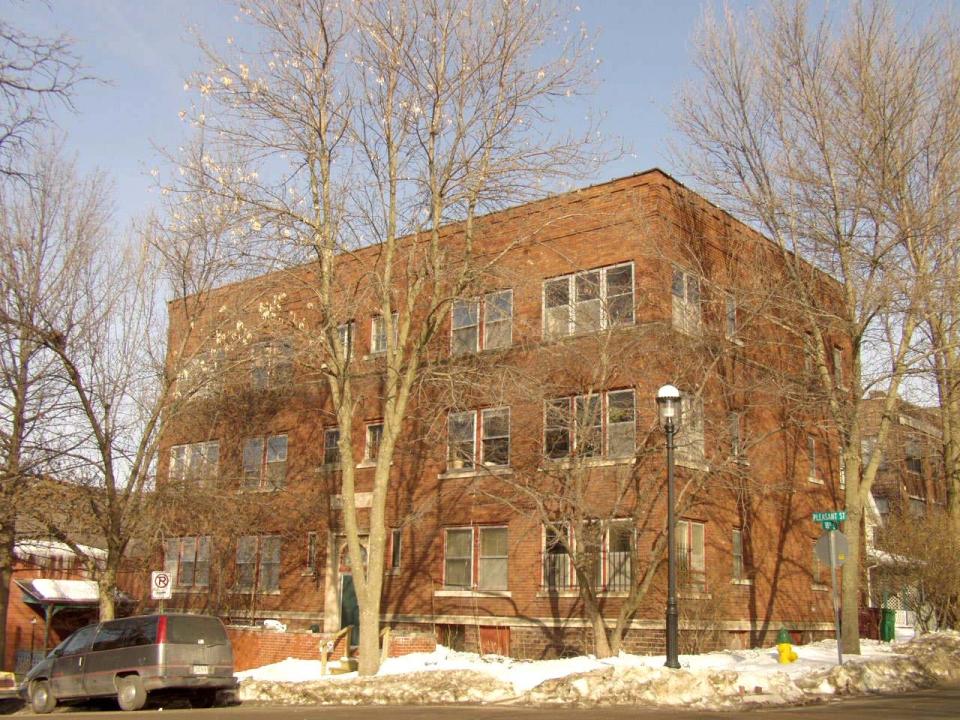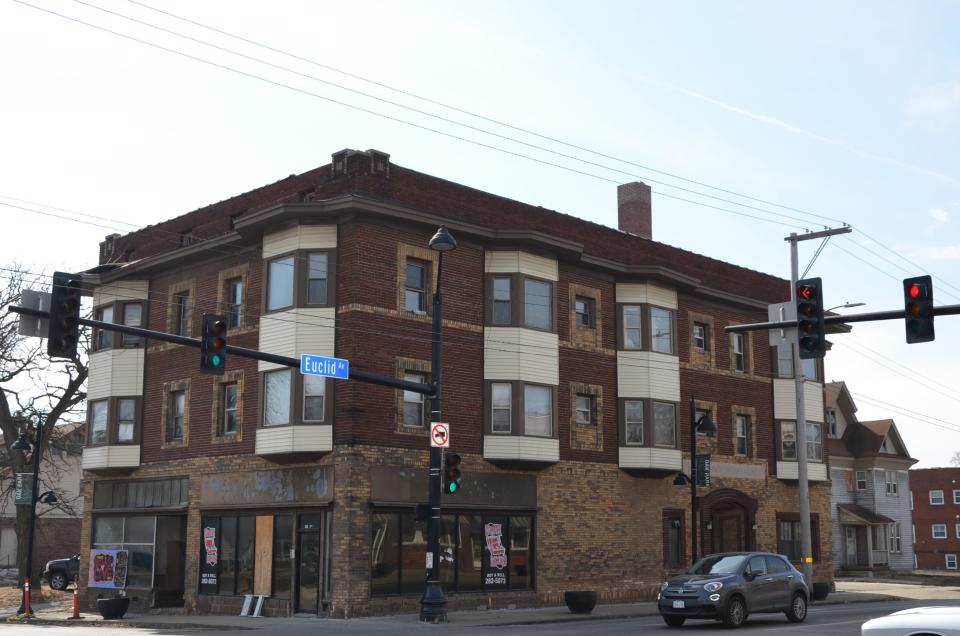Tenants worry about eviction in Des Moines building that racks up violations

A century-old building sits prominently on the corner of 18th and Pleasant streets in the Sherman Hill neighborhood of Des Moines, its brick façade lit up in the afternoon sun.
But just around the corner, at the building's back entrance, its appearance is starkly different.
Rotted-out corners reveal aging wooden beams inside, one apparently held up by a 2-by-4 board. Some of its bright-red panels have fallen off and sit in a pile in the side yard, next to shards of broken glass.
Dalton Jacobus, the city's neighborhood services administrator, acknowledged the building at 1801 Pleasant St. is not Des Moines' "crown jewel," but he says it's structurally safe. After the Des Moines Register asked in early June about the structural integrity and livability of the building, the city sent an inspector who found there is no "reason to believe that there's a risk of collapse," he said.
But in the aftermath of a May apartment building collapse in Davenport that killed three people, tenants, neighbors and other landlords in the area aren't persuaded. City inspections obtained by the Des Moines Register show the building has had 53 violations in two years — just eight of which have been resolved.
The yearslong delay in addressing issues is indicative of what two Des Moines City Council members say is an enforcement system that isn't swift at remedying problems and instead works reactively — sometimes when it's too late.
If the building's owner does not renew a rental license that's set to expire Sept. 9, tenants of 1801 Pleasant St. will be kicked out. Some say they cannot afford to move and have shied away from reporting poor conditions for fear of retaliation from either the landlord or the city.
The Des Moines Register spoke to four tenants who complained that the owner, Anthony Walker, routinely neglected to pay utility bills, resulting in heat and lighting being out for days at a time and notices of unpaid bills pasted on the front door each month.
They also said the building’s property manager, Edwin Allen, the owner of Zora Bar & Rooftop on Ingersoll Avenue in Des Moines, often grumbled at the request of maintenance work and once threatened not to renew a lease if a tenant complained too often.
The tenants and another landlord in the area spoke to the Register on the condition their names not be used for fear of retaliation.
Reached by phone this month, Allen denied ever having managed the property or having conducted work at 1801 Pleasant St. No manager is listed in official city documents for the building, but Allen has served as the city's main contact person for coordinating inspections, said city spokesperson Devin Perry.
Walker did not respond to two requests for comment. But a real estate agent marketing the building said Walker is working to bring in contractors to make some improvements.
Perry said the city cited Walker as recently as July 17 because he missed the deadline to apply for a rental license. If the license expires and the owner doesn't make the necessary improvements, the city is prepared to take legal action, Jacobus said.
"They will not get another license unless that place is significantly improved," he said. "They're under notice on that."
As the city and building's owner spar over deadlines and violations, tenants anxiously wait, not knowing whether they'll need to find a new place to live.
"We try to approach these situations with empathy," but when an owner fails to maintain the property, the city is left with no choice, Jacobus said. "When push comes to shove, we can and will do it and have done it," he said of telling residents to move out.
Building operated with over 50 violations for nearly 2 years

Walker purchased the seven-unit apartment building at 1801 Pleasant St. in 2018 for $375,000, property records show. Today, the building is back on the market for $749,900.
The building already had a business license to operate as an apartment when Walker bought it. That expired on Feb. 5, 2021, but the city did not conduct its regular renewal inspection until Sept. 9, 2021, citing a backlog from the COVID-19 pandemic and the city's switch to a new permitting software.
That inspection found 36 violations, including floors in disrepair and holes in walls and ceilings, and six of the eight apartments did not have working smoke detectors. It also found a unit that was not listed as part of the building in assessor documents and was not up to code, but had tenants living inside.
None of the violations related to structural integrity. Housing inspectors are not engineers, but Perry said they are trained to notice structural issues and refer those issues to an engineer.
The city did a follow-up inspection in January and found seven additional violations. An inspection eight months later in August found six more.
In November, the city brought the case before the Housing Appeals Board, which enforces Des Moines housing codes. The board ultimately voted to extend the building's permit until December 2022 to allow the owner time to make the required improvements.
In total, the building operated without a business license for 20 months. The new license, issued in December, says the building passed a housing code inspection, even though there were at least 28 unresolved violations documented at that time.
Jacobus said the city must work with landlords and owners and give them an opportunity to make improvements. In the case of 1801 Pleasant St., he said the owner corrected the “life-saving issues” identified in the inspections and that he obtained the permit required to make renovations, signaling to the city that he intended to make the repairs. That permit is valid through October of this year.
Following an anonymous complaint issued in June of this year, the city inspected 1801 Pleasant St. once more, finding an additional four violations, including that the fire extinguishers had expired. That inspection found violations with the back staircase, also used as the fire escape, for missing or loose handrails and balusters.
Tenants raised concerns about the staircase to the Register — one called it a "tinderbox" and another said tenants still use it but think its rickety steps and sloped banister are proof it needs serious repair.
The city scheduled a follow-up inspection for July 12 but delayed it because the owner was not able to come into town, according to Perry.
If those issues are not fixed by the next inspection, which Perry said the city is working with the owner to schedule, then the city plans to refer the case once more to the Housing Board of Appeals. Perry said the city will recommend Walker face the maximum fine of $5,000.
Jeff Horner, the real estate agent marketing the building, said Walker updated the fire extinguishers and is working on bringing in contractors to make improvements to the back wall.
The building’s permit expires Sept. 9, and Jacobus said the city’s patience is running out.
"We were working in good faith with the owner and manager. They appeared to not be working in good faith in return,” he said. “They will not get a license come Sept. 9 if they haven't made the corrections that we need them to make to bring the property into compliance. 100%."
Who has the authority to police buildings in Des Moines?
The city of Des Moines’ elected officials acknowledge that current processes aren’t enough to keep the city’s oldest, and roughest, properties in check.
Connie Boesen, an at-large council member and candidate for mayor, called in June for new city laws that would hold owners accountable for the maintenance of their properties after the Highland Apartments, a crumbling historic building in Des Moines' Highland Park business district, was scheduled for demolition because of years of damage caused by a leaky roof.
“If someone had fixed that roof 10, 15, 30 years ago, we wouldn’t be here today,” she told the council. “We need to be more proactive in how structures are kept sound.”

Over a month after the motion was made, city spokesperson Peter Zemansky told the Register the Neighborhood Services Department and city manager are still working to determine what actions the city can take.
When buildings fall into disrepair, the city holds that someone has to take care of them. If the owner fails to act, the city demolishes dangerous structures.
Des Moines is no stranger to tearing down shabby homes. The city’s Blitz on Blight program targets houses and structures it designates as public nuisances. There are 307 properties on the list.
Before demolition, owners are given time to bring their properties up to code. When a house has violations that have not been corrected after extensive time and follow-up by inspectors, court proceedings ensue.
That process can take years. And historic properties, ones that the public and city representatives believe should be saved, sometimes worsen because of age or neglect until it's too late to intervene.
Council member Josh Mandelbaum, who represents Sherman Hill, believes that the codes the city has in place are effective at preventing this — enforcement, less so.
“We've got to enforce our code and enforce it consistently over time,” he said. “There are folks living in these properties. They should be safe and habitable and well maintained, and I'm not sure that that's always been the case in the past.”
He pointed to issues with staffing, and a lack of employees who are both trained and experienced in enforcing code, as a possible cause for declining properties. When Des Moines fails to hold “bad actors” accountable, it hurts those who live in and care for their communities, Mandelbaum said.
He hopes that whatever changes the city manager's office brings forward will work proactively, instead of retroactively, to address blighted properties. Issues should be identified by inspectors and corrected before structures become unsafe, he said.
“We’ve let landlords get away with not investing and not maintaining properties in the past, and that just leads to properties eventually becoming uninhabitable,” Mandelbaum said. “Then you don't even have affordable housing; you just have no housing. You lose a property that contributed to the fabric of the neighborhood.”
Why tenants are afraid to speak up
Since 2018, two anonymous complaints have been filed against 1801 Pleasant St. City officials say the allegations in the complaints were mostly unfounded, but receiving them prompted the city to investigate.
Tenants and other members of the neighborhood told the Register they feared the possibility of eviction if they spoke out publicly. Nick Smithberg, executive director of Iowa Legal Aid, said that fear is common among tenants, particularly for those who are lower income and have fewer choices on where they can live.
"When you're a vulnerable tenant, you make noise, you can get the attention of the landlord in a way that you don't want to do. And so a lot of people are really afraid to do that," he said.
Under Iowa law, tenants have the right to live in a healthy and safe environment, but Smithberg said sometimes those rights are difficult to enforce.
"The law does protect you, even though these people are fearful," he said. "It's just that you're living in the building under the control of the property manager, and sometimes that feels a lot more present to the tenants."
Jacobus said tenants can use the city’s “Show Me My House” tool to contact a neighborhood inspector directly or submit a rental complaint form to notify the city of any problems. He said the city will accept anonymous complaints, though he noted the city is “pretty limited on the action and follow-up.”
For tenants who have found themselves in a difficult situation with their landlords, Smithberg recommends they reach out to Iowa Legal Aid for assistance. Smithberg also recommends tenants notify their landlords immediately of any problems and document all of their communication in writing. For more information, visit https://www.iowalegalaid.org/issues/housing.
Editor's note: This story has been updated to correct attribution to a quote from Dalton Jacobus, the city's neighborhood services administrator, on the structural integrity of the building.
City government reporter Virginia Barreda contributed reporting.
Francesca Block is a breaking news reporter at the Des Moines Register. Reach her at FBlock@registermedia.com or on Twitter at@francescablock3.
Addison Lathers covers growth and development in the Des Moines metro. Reach her at ALathers@registermedia.com.
This article originally appeared on Des Moines Register: Des Moines tenants may be evicted from building with several violations

